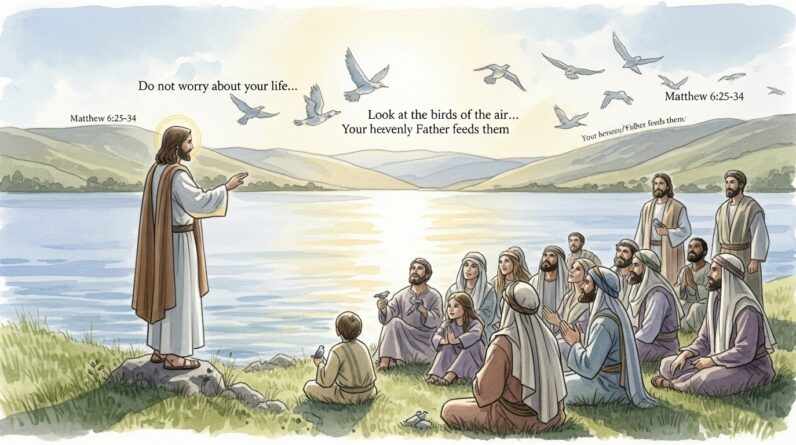Introduction
Hey there! So, you’re feeling a bit panicked about finances, huh? First of all, you’re not alone. We live in an age where money talks — and sometimes, it feels like it’s shouting at the top of its lungs. But here’s some good news: this journey from financial chaos to a peaceful state isn’t one you have to make solo. Welcome to “From Panic to Peace: A Christian Guide to Financial Calm”. Here, we’ll walk together through a Christian guide to finances, step by step, blending spirituality with practical advice to achieve tranquility in your monetary life. Grab a cup of tea and let’s dive in.
Understanding Financial Panic
If your heart starts racing when the credit card bill arrives or you lie awake at night pondering unforeseen expenses, you’re experiencing financial panic. It’s a very real, very stressful emotion that stems from uncertainty or a lack of control over money matters. What causes this unrest? Often, it’s a mixture of debt, unexpected expenses, and sometimes, sheer lack of knowledge about how to manage money. But, fear not, because awareness is the first step in our Christian guide to finances.
Reflecting on God’s Promises
Before delving into budgeting or saving strategies, we need to pause and remind ourselves of the promises God makes. Over and over in the Bible, we’re reassured of His provisions. In Matthew 6:26, Jesus reminds us, “Look at the birds of the air; they do not sow or reap or store away in barns, and yet your heavenly Father feeds them. Are you not much more valuable than they?” Let that sink in for a moment. Your value in God’s eyes is immense, and His care for you extends even into your finances.
Embracing a Mindset of Stewardship
Christian teachings often focus on stewardship, which is the idea that we are caretakers of what God has entrusted to us, rather than owners. This mindset shift can bring immense relief. It’s not all on your shoulders. As stewards, we are called to manage God’s gifts with gratitude and responsibility. In 1 Peter 4:10, we read, “Each of you should use whatever gift you have received to serve others, as faithful stewards of God’s grace in its various forms.”
Why Stewardship Matters
But why does this matter? When you see yourself as a steward rather than an owner, financial hardships can transform from burdens into challenges that you’re equipped to overcome. It’s no longer about accumulating wealth for its own sake, but about using resources wisely in ways that honor God and bless others.
Practicing Financial Fasting
Have you ever considered a financial fast? This concept mirrors the spiritual discipline of fasting by voluntarily limiting your expenses to refocus on spiritual growth. By stepping back and resisting the urge to spend beyond essentials, you’ll not only save money but also develop a deeper reliance on God’s provisions. It’s a practical step in our Christian guide to finances that intertwines spirituality with budgeting.
How to Start a Financial Fast
- Begin with a prayer for guidance and determination.
- Set a time limit, perhaps a week or a month.
- Identify spending categories to cut back on (eating out, entertainment).
- Focus on needs over wants during this period.
Engage in activities that cost nothing but enrich immensely, like reading scripture, taking nature walks, or volunteering. You’ll likely emerge from your financial fast with newfound clarity and appreciation for what you have.
Building a Budget with Biblical Wisdom
Once you’ve reflected and practiced financial fasting, the next step is building a budget. A well-crafted budget is not only practical but also an embodiment of the discipline the Bible encourages. In Proverbs 21:5, we learn, “The plans of the diligent lead to profit as surely as haste leads to poverty.” Crafting and sticking to a plan can lead to financial peace.
Steps to Creating a Christian Budget
- List Your Income: Identify all sources of income. Recognize this is God’s provision for you and thank Him for it.
- Track Your Expenses: Know where your money goes each month, even the small stuff.
- Set Financial Goals: These should align with your values and stewardship principles.
- Plan for Giving: Decide in advance how much to give. Trust in the promise of Luke 6:38, “Give, and it will be given to you…”
- Allow Savings: Build an emergency fund that helps prevent financial panic.
- Review Regularly: Adjust your budget as life changes to keep aligned with your goals.
Dealing With Debt as a Christian
Debt can feel like a heavy chain, pulling you down into a sea of anxiety. But remember, you’re not meant to fight this alone. Start by acknowledging it with honesty, then formulate a plan to tackle it with faith and perseverance. Proverbs 22:7 warns us, “The borrower is slave to the lender,” which is a call to approach debt thoughtfully and intentionally in our Christian guide to finances.
Strategies for Managing Debt
- Create a Debt Payoff Plan: List all debts from smallest to largest or by interest rate. Devote extra resources to tackle the smallest or highest interest debt first while maintaining minimum payments on others.
- Seek Support and Accountability: Join a small group or class focused on financial peace to stay motivated.
- Pray for Strength and Guidance: You’re never alone in this journey; God is with you every step.
Practicing Generosity as a Path to Peace
Giving, especially when funds are tight, might seem counterintuitive. However, generosity paves the way to true financial peace. In the early church, believers exhibited astonishing generosity, trusting God to meet all needs (Acts 2:44-45). This type of giving, in faith and love, enlarges your heart and connects you more deeply with God and others.
How Generosity Transforms
- It Breaks the Chains of Greed: Helping others shifts focus from self to community.
- It Strengthens Faith: Trusting that God will provide energizes your soul.
- It Reflects Christ’s Love: Your giving becomes a living testimony of your faith.

Cultivating Gratitude in Every Season
Gratitude isn’t just a warm, fuzzy feeling; it’s a powerful financial tool rooted in biblical wisdom. By continuously thanking God for His blessings, even during tough times, you cultivate a mindset that sees abundance rather than lack. 1 Thessalonians 5:18 urges, “Give thanks in all circumstances; for this is God’s will for you in Christ Jesus.”
Steps to Cultivate Gratitude
- Daily Gratitude Journaling: Every day, jot down three things you’re thankful for, no matter how small.
- Prayer and Reflection: Regularly thank God for His provisions in your quiet time.
- Express Appreciation to Others: Simple thanks can nurture relationships and foster gratitude.
Trusting in God’s Timing
Financial peace requires a reliance on God’s timing and understanding, rather than our own. While it often contradicts human logic, waiting on God can lead to outcomes far beyond our limited scope. Ecclesiastes 3:1 reminds us, “There is a time for everything, and a season for every activity under the heavens.”
Lessons from Trusting God’s Timing
- Patience as Practice: Trusting God builds patience and resilience.
- Aligns Hearts with Divine Purpose: God’s plans for you are filled with hope and a future (Jeremiah 29:11).
Conclusion
And there you have it, your Christian guide to finances from a place of panic towards one of peace and understanding. Whether it’s through the lens of stewardship, through intentional budgeting, or by practicing gratitude, you can find comfort in the knowledge that financial peace is possible with God’s guidance. As you walk this path, may you feel lighter, more connected, and resolutely on a course that aligns with God’s will for you.
Explore More
For further reading and encouragement, check out these posts:
👉 7 Bible Verses About Faith in Hard Times
👉 Job’s Faith: What We Can Learn From His Trials
👉 How To Trust God When Everything Falls Apart
👉 Why God Allows Suffering – A Biblical Perspective
👉 Faith Over Fear: How To Stand Strong In Uncertain Seasons
👉 How To Encourage Someone Struggling With Their Faith
👉 5 Prayers for Strength When You’re Feeling Weak

📘 Jesus and the Woman Caught in Adultery – Grace and Mercy Over Judgement
A powerful retelling of John 8:1-11. This book brings to life the depth of forgiveness, mercy, and God’s unwavering love.
👉 Check it now on Amazon
As a ClickBank Affiliate, I earn from qualifying purchases.
Acknowledgment: All Bible verses referenced in this article were accessed via Bible Gateway (or Bible Hub).
“Want to explore more? Check out our latest post on Why Jesus? and discover the life-changing truth of the Gospel!”








